University Audit, Assurance and Compliance Report: Enron and Auditors
VerifiedAdded on 2023/04/22
|17
|4387
|185
Report
AI Summary
This report delves into the critical aspects of audit, assurance, and compliance, examining the impact of material misstatements on stakeholders, particularly focusing on Rio Tinto. It explores the relationship between auditor independence and whistleblowing within the context of public interest requirements, referencing APES 110. The report then analyzes the lessons learned from the Enron scandal and the behaviors of Arthur Andersen, emphasizing the manipulation of accounting books, the need for improved auditing standards, independent oversight, and incentives for audit quality. Furthermore, it highlights the importance of strong internal controls and effective relationships between audit committees and auditors. The report concludes by discussing the necessary steps auditors should take to enhance audit quality and prevent future corporate collapses.
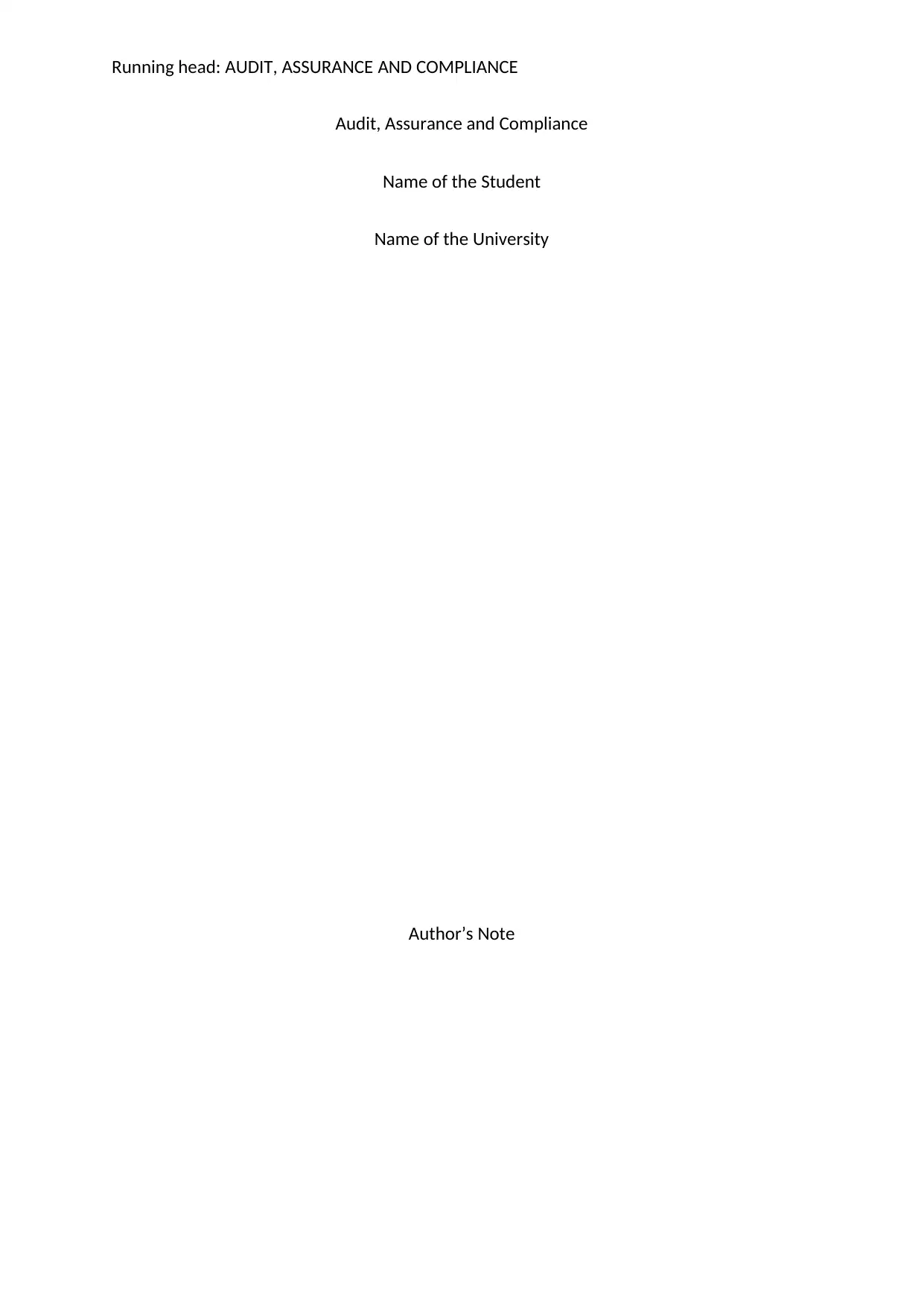
Running head: AUDIT, ASSURANCE AND COMPLIANCE
Audit, Assurance and Compliance
Name of the Student
Name of the University
Author’s Note
Audit, Assurance and Compliance
Name of the Student
Name of the University
Author’s Note
Paraphrase This Document
Need a fresh take? Get an instant paraphrase of this document with our AI Paraphraser
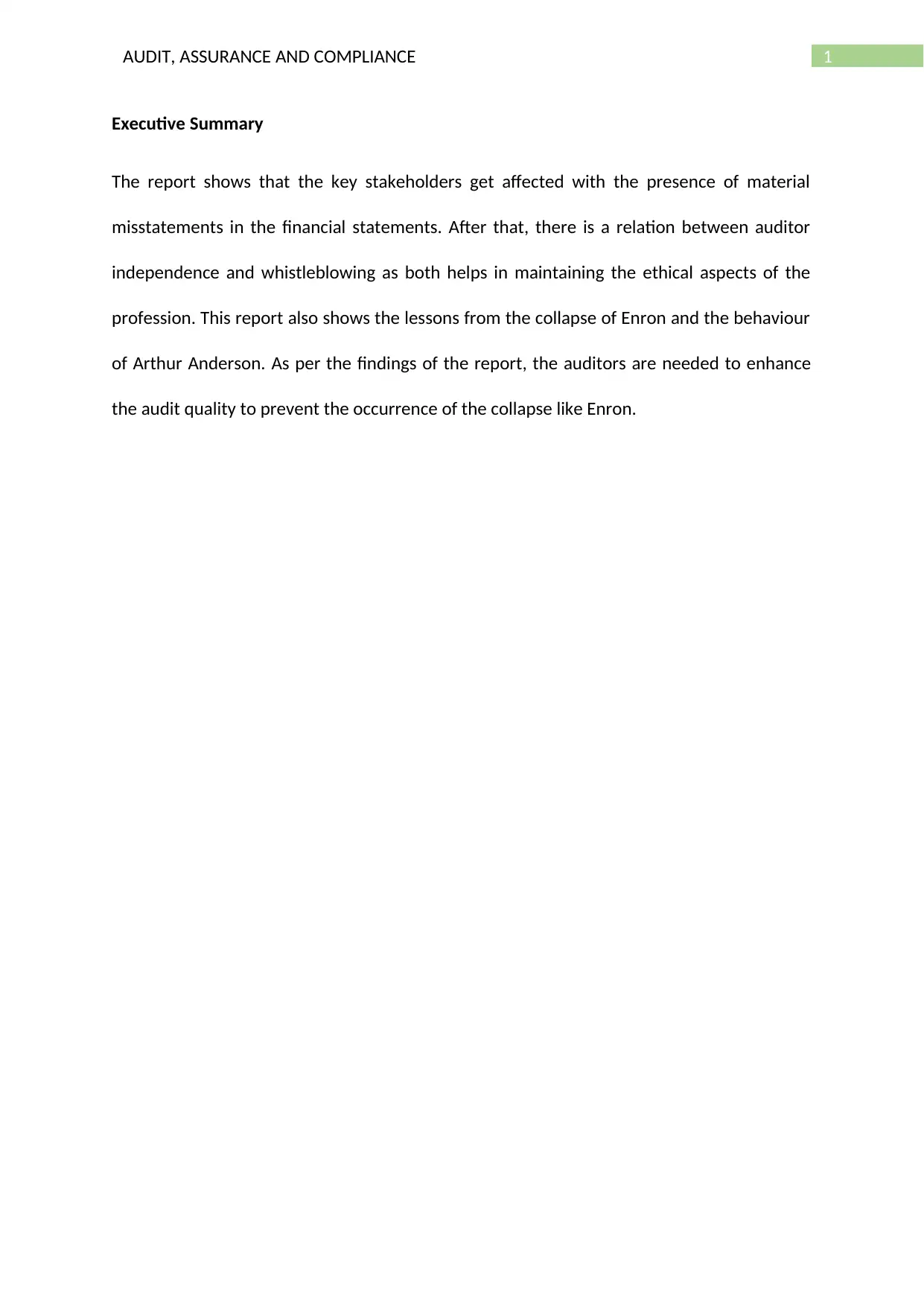
1AUDIT, ASSURANCE AND COMPLIANCE
Executive Summary
The report shows that the key stakeholders get affected with the presence of material
misstatements in the financial statements. After that, there is a relation between auditor
independence and whistleblowing as both helps in maintaining the ethical aspects of the
profession. This report also shows the lessons from the collapse of Enron and the behaviour
of Arthur Anderson. As per the findings of the report, the auditors are needed to enhance
the audit quality to prevent the occurrence of the collapse like Enron.
Executive Summary
The report shows that the key stakeholders get affected with the presence of material
misstatements in the financial statements. After that, there is a relation between auditor
independence and whistleblowing as both helps in maintaining the ethical aspects of the
profession. This report also shows the lessons from the collapse of Enron and the behaviour
of Arthur Anderson. As per the findings of the report, the auditors are needed to enhance
the audit quality to prevent the occurrence of the collapse like Enron.
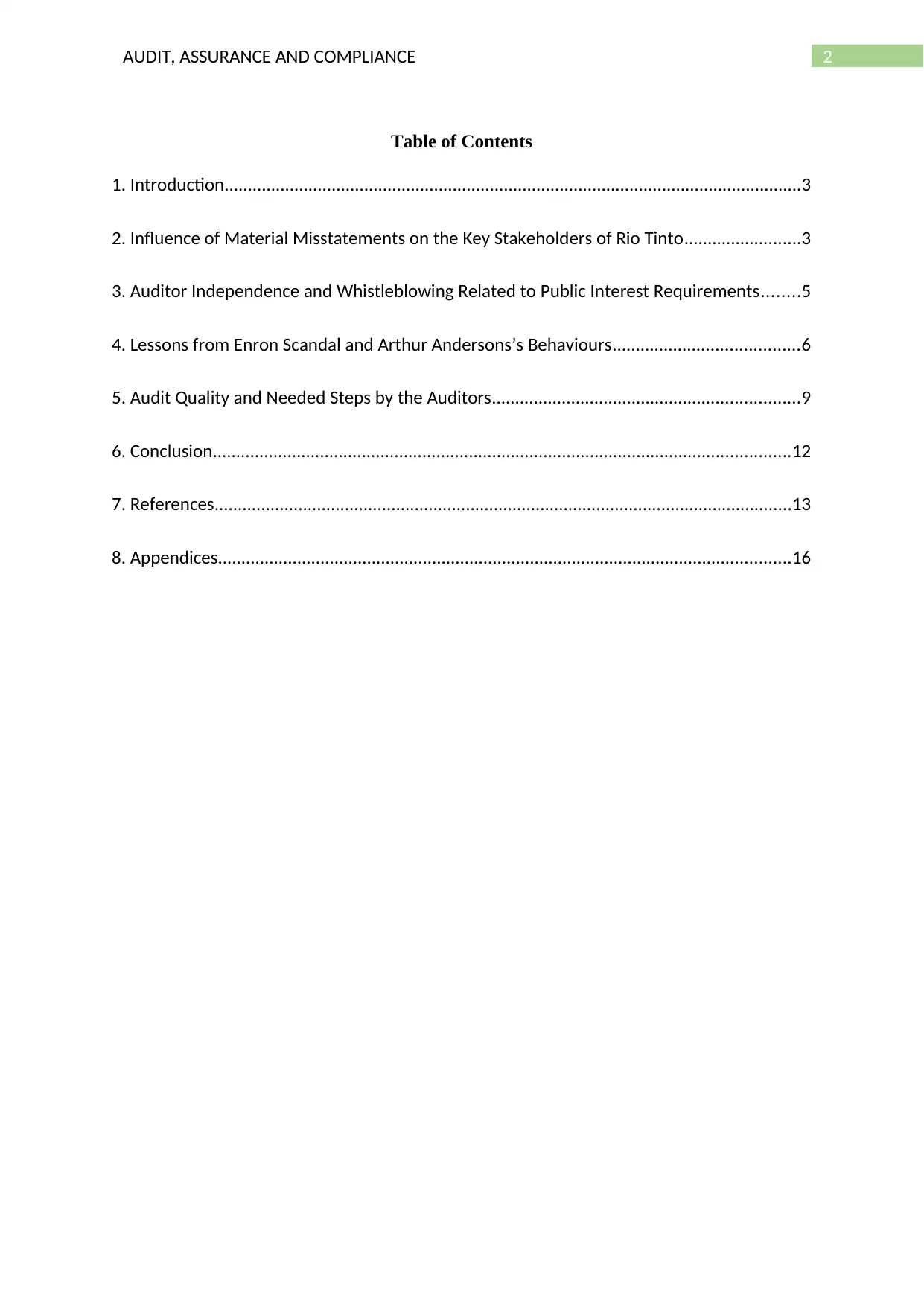
2AUDIT, ASSURANCE AND COMPLIANCE
Table of Contents
1. Introduction............................................................................................................................3
2. Influence of Material Misstatements on the Key Stakeholders of Rio Tinto.........................3
3. Auditor Independence and Whistleblowing Related to Public Interest Requirements........5
4. Lessons from Enron Scandal and Arthur Andersons’s Behaviours........................................6
5. Audit Quality and Needed Steps by the Auditors..................................................................9
6. Conclusion............................................................................................................................12
7. References............................................................................................................................13
8. Appendices...........................................................................................................................16
Table of Contents
1. Introduction............................................................................................................................3
2. Influence of Material Misstatements on the Key Stakeholders of Rio Tinto.........................3
3. Auditor Independence and Whistleblowing Related to Public Interest Requirements........5
4. Lessons from Enron Scandal and Arthur Andersons’s Behaviours........................................6
5. Audit Quality and Needed Steps by the Auditors..................................................................9
6. Conclusion............................................................................................................................12
7. References............................................................................................................................13
8. Appendices...........................................................................................................................16
⊘ This is a preview!⊘
Do you want full access?
Subscribe today to unlock all pages.

Trusted by 1+ million students worldwide
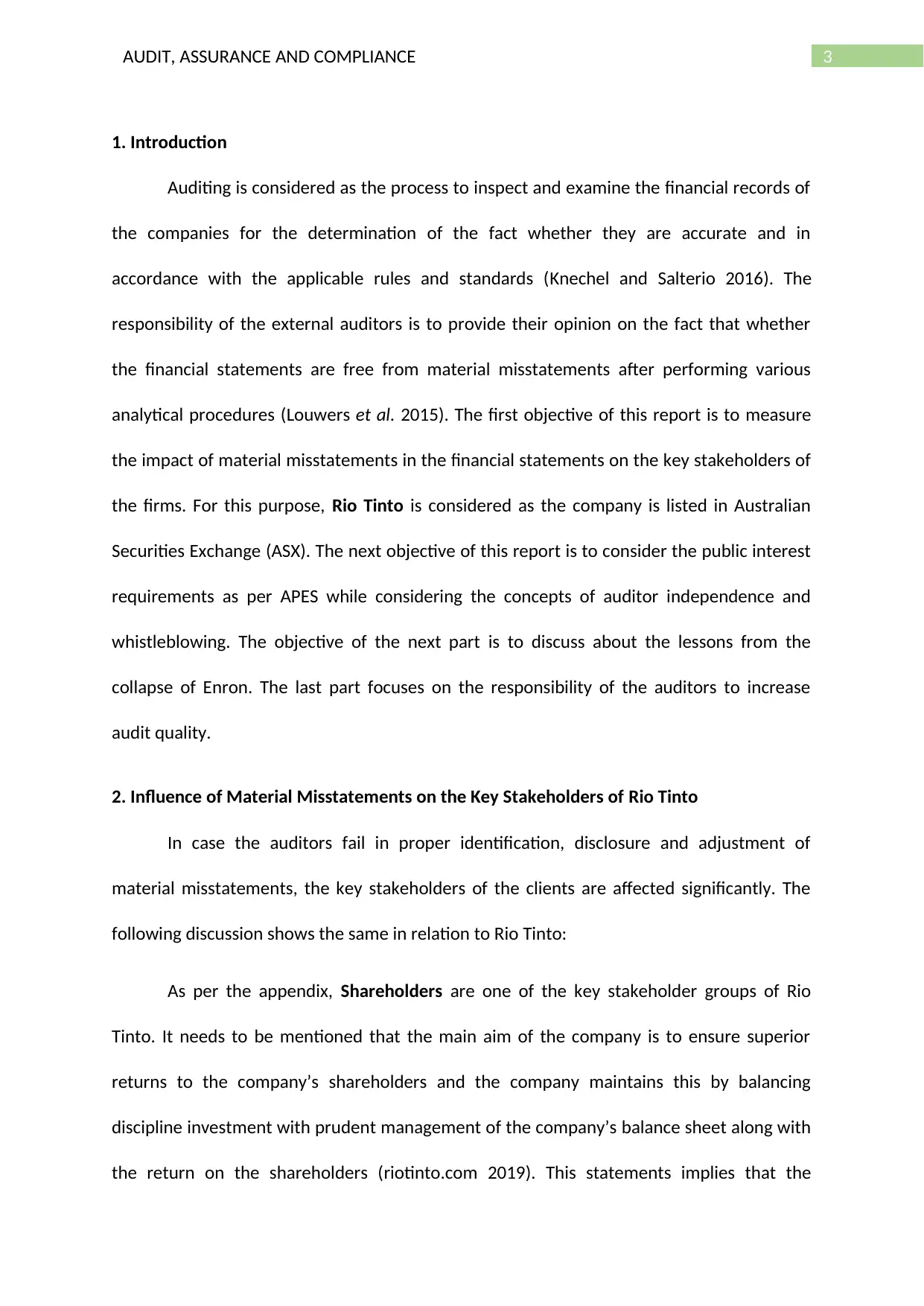
3AUDIT, ASSURANCE AND COMPLIANCE
1. Introduction
Auditing is considered as the process to inspect and examine the financial records of
the companies for the determination of the fact whether they are accurate and in
accordance with the applicable rules and standards (Knechel and Salterio 2016). The
responsibility of the external auditors is to provide their opinion on the fact that whether
the financial statements are free from material misstatements after performing various
analytical procedures (Louwers et al. 2015). The first objective of this report is to measure
the impact of material misstatements in the financial statements on the key stakeholders of
the firms. For this purpose, Rio Tinto is considered as the company is listed in Australian
Securities Exchange (ASX). The next objective of this report is to consider the public interest
requirements as per APES while considering the concepts of auditor independence and
whistleblowing. The objective of the next part is to discuss about the lessons from the
collapse of Enron. The last part focuses on the responsibility of the auditors to increase
audit quality.
2. Influence of Material Misstatements on the Key Stakeholders of Rio Tinto
In case the auditors fail in proper identification, disclosure and adjustment of
material misstatements, the key stakeholders of the clients are affected significantly. The
following discussion shows the same in relation to Rio Tinto:
As per the appendix, Shareholders are one of the key stakeholder groups of Rio
Tinto. It needs to be mentioned that the main aim of the company is to ensure superior
returns to the company’s shareholders and the company maintains this by balancing
discipline investment with prudent management of the company’s balance sheet along with
the return on the shareholders (riotinto.com 2019). This statements implies that the
1. Introduction
Auditing is considered as the process to inspect and examine the financial records of
the companies for the determination of the fact whether they are accurate and in
accordance with the applicable rules and standards (Knechel and Salterio 2016). The
responsibility of the external auditors is to provide their opinion on the fact that whether
the financial statements are free from material misstatements after performing various
analytical procedures (Louwers et al. 2015). The first objective of this report is to measure
the impact of material misstatements in the financial statements on the key stakeholders of
the firms. For this purpose, Rio Tinto is considered as the company is listed in Australian
Securities Exchange (ASX). The next objective of this report is to consider the public interest
requirements as per APES while considering the concepts of auditor independence and
whistleblowing. The objective of the next part is to discuss about the lessons from the
collapse of Enron. The last part focuses on the responsibility of the auditors to increase
audit quality.
2. Influence of Material Misstatements on the Key Stakeholders of Rio Tinto
In case the auditors fail in proper identification, disclosure and adjustment of
material misstatements, the key stakeholders of the clients are affected significantly. The
following discussion shows the same in relation to Rio Tinto:
As per the appendix, Shareholders are one of the key stakeholder groups of Rio
Tinto. It needs to be mentioned that the main aim of the company is to ensure superior
returns to the company’s shareholders and the company maintains this by balancing
discipline investment with prudent management of the company’s balance sheet along with
the return on the shareholders (riotinto.com 2019). This statements implies that the
Paraphrase This Document
Need a fresh take? Get an instant paraphrase of this document with our AI Paraphraser
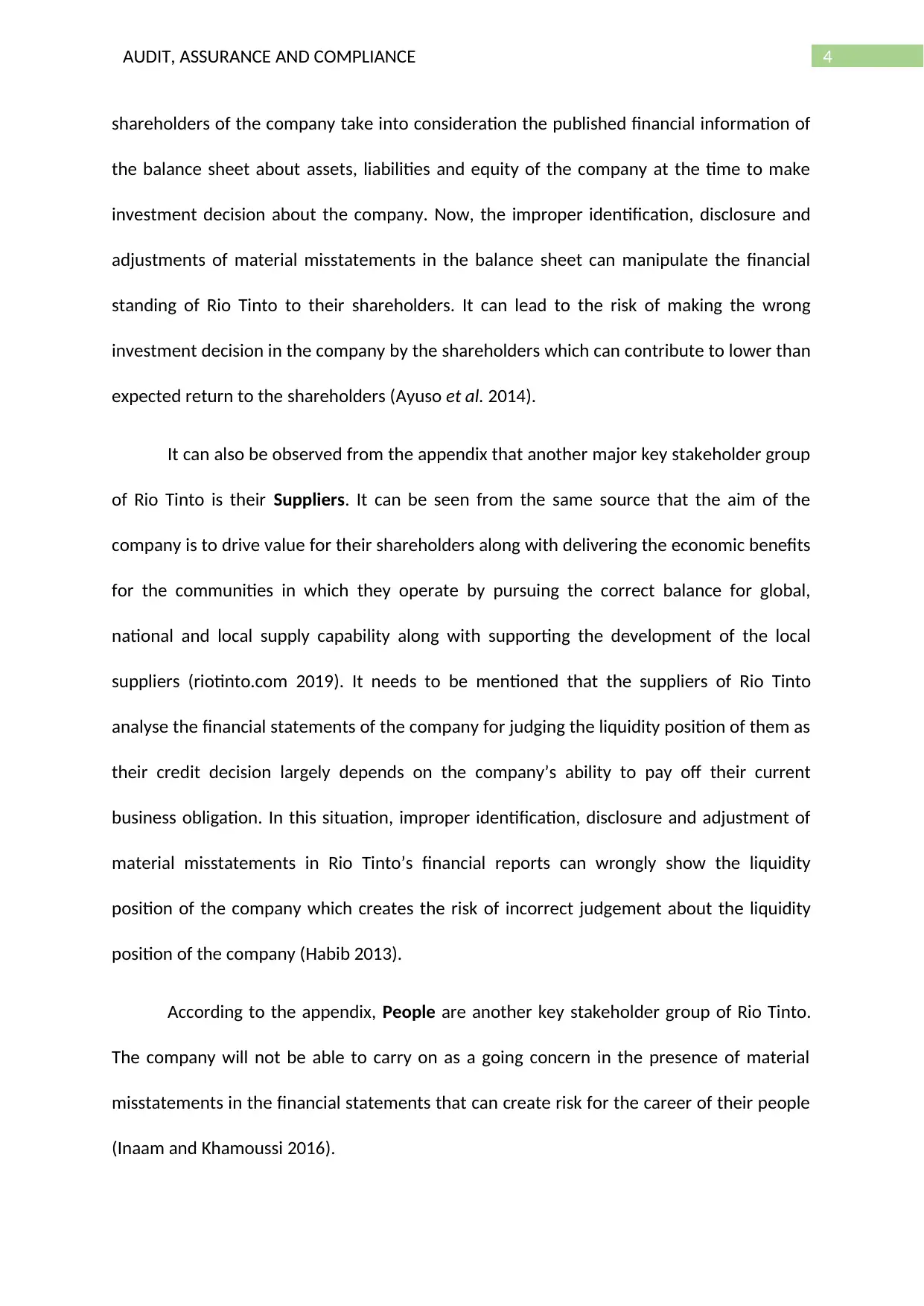
4AUDIT, ASSURANCE AND COMPLIANCE
shareholders of the company take into consideration the published financial information of
the balance sheet about assets, liabilities and equity of the company at the time to make
investment decision about the company. Now, the improper identification, disclosure and
adjustments of material misstatements in the balance sheet can manipulate the financial
standing of Rio Tinto to their shareholders. It can lead to the risk of making the wrong
investment decision in the company by the shareholders which can contribute to lower than
expected return to the shareholders (Ayuso et al. 2014).
It can also be observed from the appendix that another major key stakeholder group
of Rio Tinto is their Suppliers. It can be seen from the same source that the aim of the
company is to drive value for their shareholders along with delivering the economic benefits
for the communities in which they operate by pursuing the correct balance for global,
national and local supply capability along with supporting the development of the local
suppliers (riotinto.com 2019). It needs to be mentioned that the suppliers of Rio Tinto
analyse the financial statements of the company for judging the liquidity position of them as
their credit decision largely depends on the company’s ability to pay off their current
business obligation. In this situation, improper identification, disclosure and adjustment of
material misstatements in Rio Tinto’s financial reports can wrongly show the liquidity
position of the company which creates the risk of incorrect judgement about the liquidity
position of the company (Habib 2013).
According to the appendix, People are another key stakeholder group of Rio Tinto.
The company will not be able to carry on as a going concern in the presence of material
misstatements in the financial statements that can create risk for the career of their people
(Inaam and Khamoussi 2016).
shareholders of the company take into consideration the published financial information of
the balance sheet about assets, liabilities and equity of the company at the time to make
investment decision about the company. Now, the improper identification, disclosure and
adjustments of material misstatements in the balance sheet can manipulate the financial
standing of Rio Tinto to their shareholders. It can lead to the risk of making the wrong
investment decision in the company by the shareholders which can contribute to lower than
expected return to the shareholders (Ayuso et al. 2014).
It can also be observed from the appendix that another major key stakeholder group
of Rio Tinto is their Suppliers. It can be seen from the same source that the aim of the
company is to drive value for their shareholders along with delivering the economic benefits
for the communities in which they operate by pursuing the correct balance for global,
national and local supply capability along with supporting the development of the local
suppliers (riotinto.com 2019). It needs to be mentioned that the suppliers of Rio Tinto
analyse the financial statements of the company for judging the liquidity position of them as
their credit decision largely depends on the company’s ability to pay off their current
business obligation. In this situation, improper identification, disclosure and adjustment of
material misstatements in Rio Tinto’s financial reports can wrongly show the liquidity
position of the company which creates the risk of incorrect judgement about the liquidity
position of the company (Habib 2013).
According to the appendix, People are another key stakeholder group of Rio Tinto.
The company will not be able to carry on as a going concern in the presence of material
misstatements in the financial statements that can create risk for the career of their people
(Inaam and Khamoussi 2016).
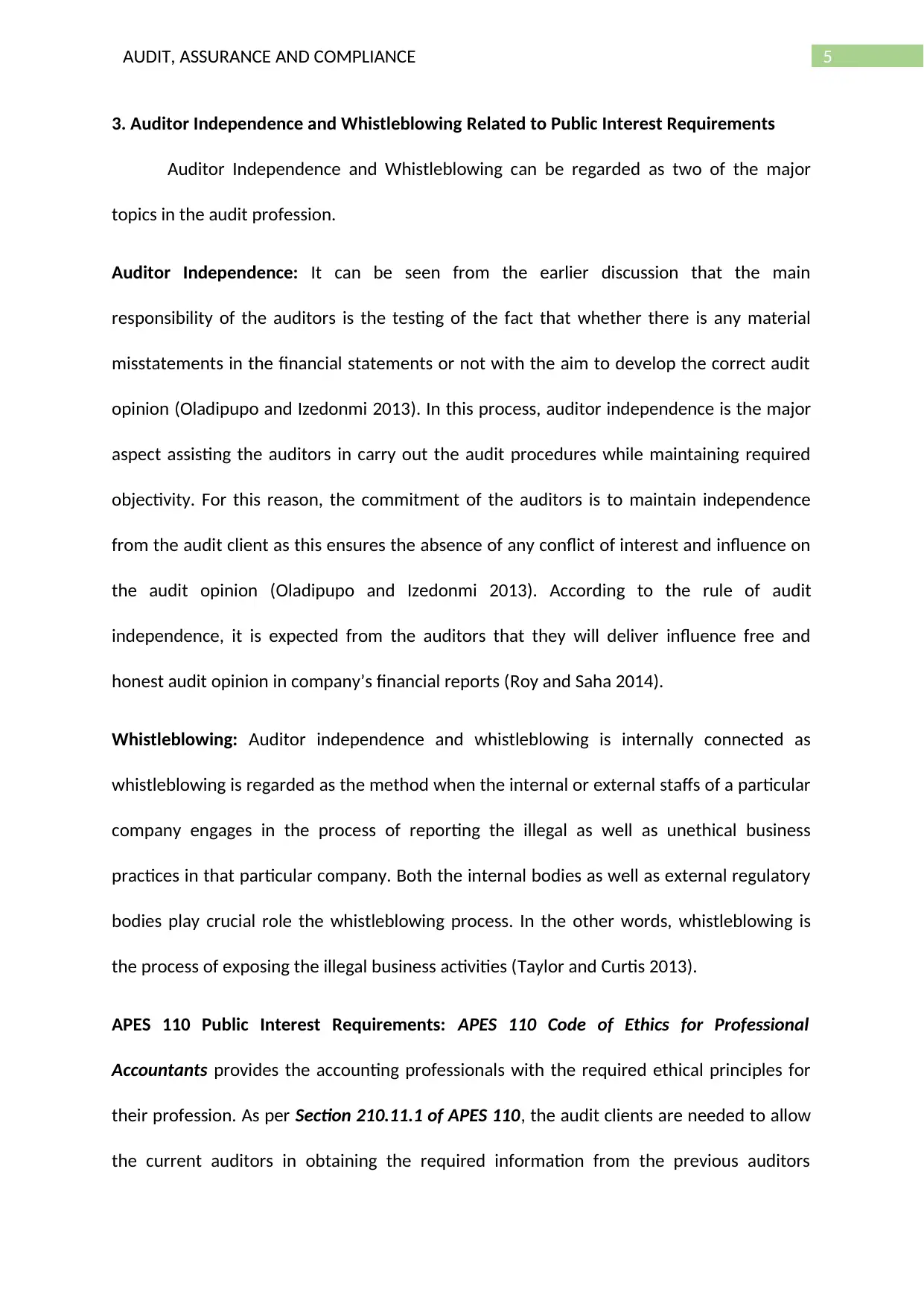
5AUDIT, ASSURANCE AND COMPLIANCE
3. Auditor Independence and Whistleblowing Related to Public Interest Requirements
Auditor Independence and Whistleblowing can be regarded as two of the major
topics in the audit profession.
Auditor Independence: It can be seen from the earlier discussion that the main
responsibility of the auditors is the testing of the fact that whether there is any material
misstatements in the financial statements or not with the aim to develop the correct audit
opinion (Oladipupo and Izedonmi 2013). In this process, auditor independence is the major
aspect assisting the auditors in carry out the audit procedures while maintaining required
objectivity. For this reason, the commitment of the auditors is to maintain independence
from the audit client as this ensures the absence of any conflict of interest and influence on
the audit opinion (Oladipupo and Izedonmi 2013). According to the rule of audit
independence, it is expected from the auditors that they will deliver influence free and
honest audit opinion in company’s financial reports (Roy and Saha 2014).
Whistleblowing: Auditor independence and whistleblowing is internally connected as
whistleblowing is regarded as the method when the internal or external staffs of a particular
company engages in the process of reporting the illegal as well as unethical business
practices in that particular company. Both the internal bodies as well as external regulatory
bodies play crucial role the whistleblowing process. In the other words, whistleblowing is
the process of exposing the illegal business activities (Taylor and Curtis 2013).
APES 110 Public Interest Requirements: APES 110 Code of Ethics for Professional
Accountants provides the accounting professionals with the required ethical principles for
their profession. As per Section 210.11.1 of APES 110, the audit clients are needed to allow
the current auditors in obtaining the required information from the previous auditors
3. Auditor Independence and Whistleblowing Related to Public Interest Requirements
Auditor Independence and Whistleblowing can be regarded as two of the major
topics in the audit profession.
Auditor Independence: It can be seen from the earlier discussion that the main
responsibility of the auditors is the testing of the fact that whether there is any material
misstatements in the financial statements or not with the aim to develop the correct audit
opinion (Oladipupo and Izedonmi 2013). In this process, auditor independence is the major
aspect assisting the auditors in carry out the audit procedures while maintaining required
objectivity. For this reason, the commitment of the auditors is to maintain independence
from the audit client as this ensures the absence of any conflict of interest and influence on
the audit opinion (Oladipupo and Izedonmi 2013). According to the rule of audit
independence, it is expected from the auditors that they will deliver influence free and
honest audit opinion in company’s financial reports (Roy and Saha 2014).
Whistleblowing: Auditor independence and whistleblowing is internally connected as
whistleblowing is regarded as the method when the internal or external staffs of a particular
company engages in the process of reporting the illegal as well as unethical business
practices in that particular company. Both the internal bodies as well as external regulatory
bodies play crucial role the whistleblowing process. In the other words, whistleblowing is
the process of exposing the illegal business activities (Taylor and Curtis 2013).
APES 110 Public Interest Requirements: APES 110 Code of Ethics for Professional
Accountants provides the accounting professionals with the required ethical principles for
their profession. As per Section 210.11.1 of APES 110, the audit clients are needed to allow
the current auditors in obtaining the required information from the previous auditors
⊘ This is a preview!⊘
Do you want full access?
Subscribe today to unlock all pages.

Trusted by 1+ million students worldwide
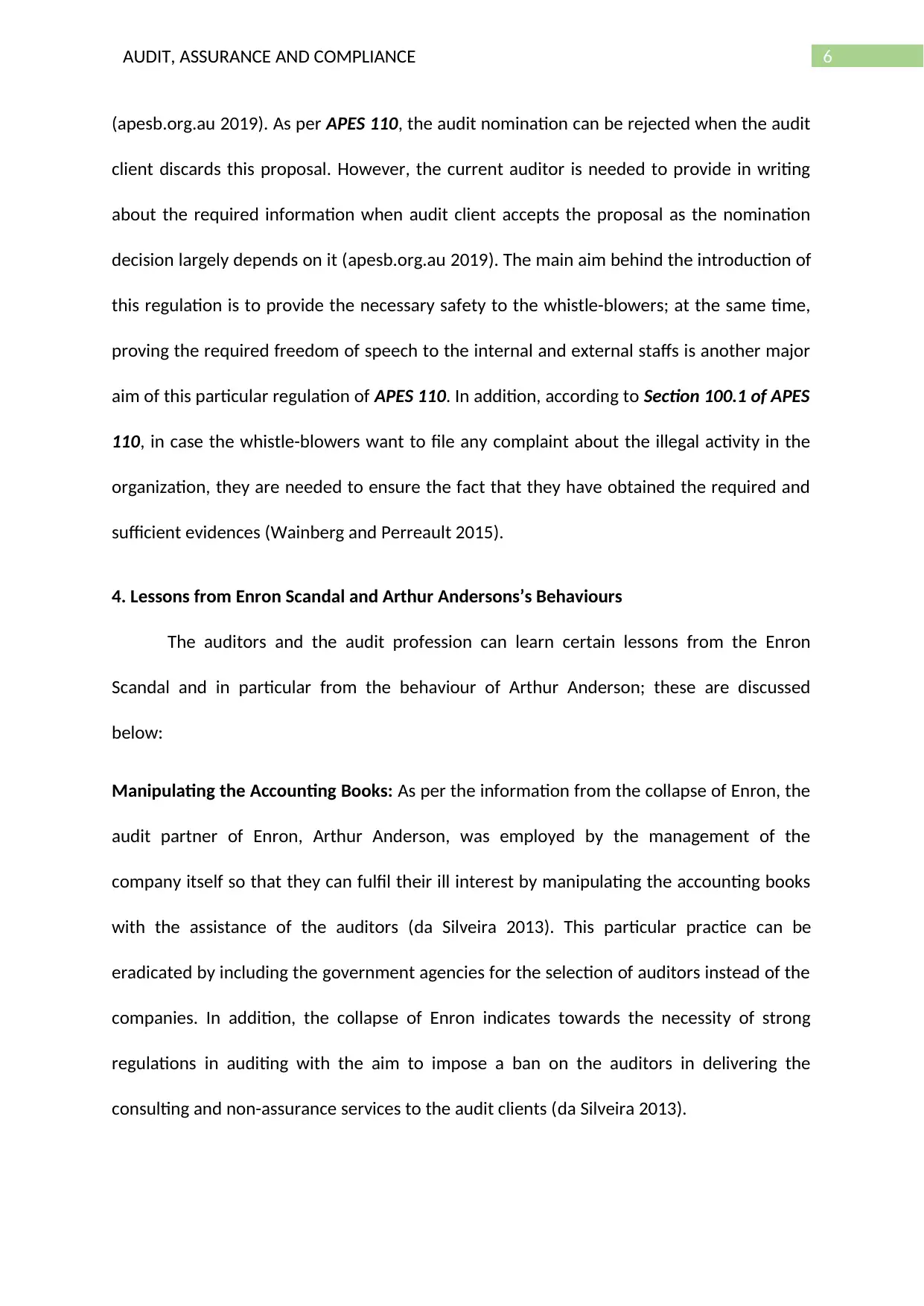
6AUDIT, ASSURANCE AND COMPLIANCE
(apesb.org.au 2019). As per APES 110, the audit nomination can be rejected when the audit
client discards this proposal. However, the current auditor is needed to provide in writing
about the required information when audit client accepts the proposal as the nomination
decision largely depends on it (apesb.org.au 2019). The main aim behind the introduction of
this regulation is to provide the necessary safety to the whistle-blowers; at the same time,
proving the required freedom of speech to the internal and external staffs is another major
aim of this particular regulation of APES 110. In addition, according to Section 100.1 of APES
110, in case the whistle-blowers want to file any complaint about the illegal activity in the
organization, they are needed to ensure the fact that they have obtained the required and
sufficient evidences (Wainberg and Perreault 2015).
4. Lessons from Enron Scandal and Arthur Andersons’s Behaviours
The auditors and the audit profession can learn certain lessons from the Enron
Scandal and in particular from the behaviour of Arthur Anderson; these are discussed
below:
Manipulating the Accounting Books: As per the information from the collapse of Enron, the
audit partner of Enron, Arthur Anderson, was employed by the management of the
company itself so that they can fulfil their ill interest by manipulating the accounting books
with the assistance of the auditors (da Silveira 2013). This particular practice can be
eradicated by including the government agencies for the selection of auditors instead of the
companies. In addition, the collapse of Enron indicates towards the necessity of strong
regulations in auditing with the aim to impose a ban on the auditors in delivering the
consulting and non-assurance services to the audit clients (da Silveira 2013).
(apesb.org.au 2019). As per APES 110, the audit nomination can be rejected when the audit
client discards this proposal. However, the current auditor is needed to provide in writing
about the required information when audit client accepts the proposal as the nomination
decision largely depends on it (apesb.org.au 2019). The main aim behind the introduction of
this regulation is to provide the necessary safety to the whistle-blowers; at the same time,
proving the required freedom of speech to the internal and external staffs is another major
aim of this particular regulation of APES 110. In addition, according to Section 100.1 of APES
110, in case the whistle-blowers want to file any complaint about the illegal activity in the
organization, they are needed to ensure the fact that they have obtained the required and
sufficient evidences (Wainberg and Perreault 2015).
4. Lessons from Enron Scandal and Arthur Andersons’s Behaviours
The auditors and the audit profession can learn certain lessons from the Enron
Scandal and in particular from the behaviour of Arthur Anderson; these are discussed
below:
Manipulating the Accounting Books: As per the information from the collapse of Enron, the
audit partner of Enron, Arthur Anderson, was employed by the management of the
company itself so that they can fulfil their ill interest by manipulating the accounting books
with the assistance of the auditors (da Silveira 2013). This particular practice can be
eradicated by including the government agencies for the selection of auditors instead of the
companies. In addition, the collapse of Enron indicates towards the necessity of strong
regulations in auditing with the aim to impose a ban on the auditors in delivering the
consulting and non-assurance services to the audit clients (da Silveira 2013).
Paraphrase This Document
Need a fresh take? Get an instant paraphrase of this document with our AI Paraphraser
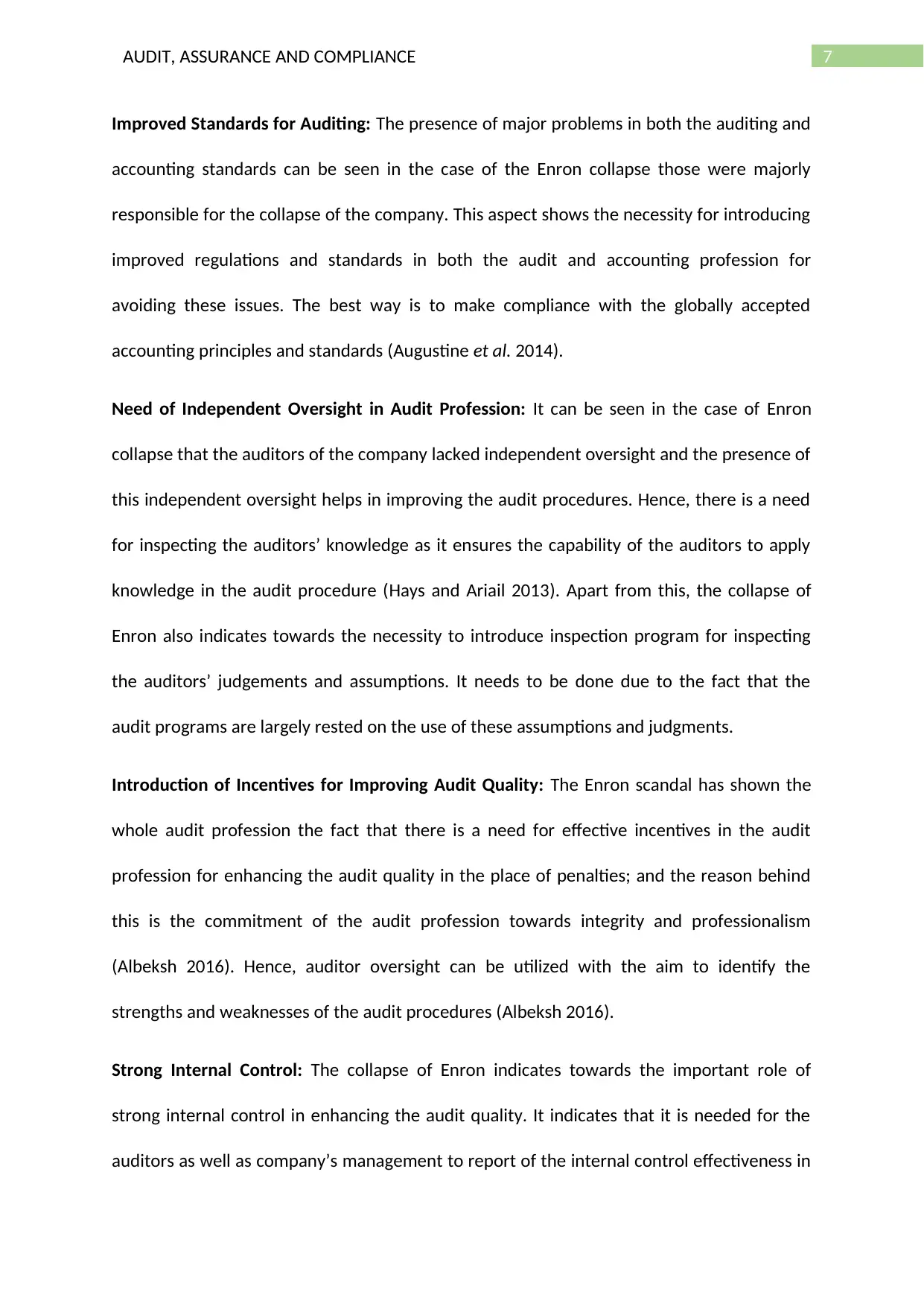
7AUDIT, ASSURANCE AND COMPLIANCE
Improved Standards for Auditing: The presence of major problems in both the auditing and
accounting standards can be seen in the case of the Enron collapse those were majorly
responsible for the collapse of the company. This aspect shows the necessity for introducing
improved regulations and standards in both the audit and accounting profession for
avoiding these issues. The best way is to make compliance with the globally accepted
accounting principles and standards (Augustine et al. 2014).
Need of Independent Oversight in Audit Profession: It can be seen in the case of Enron
collapse that the auditors of the company lacked independent oversight and the presence of
this independent oversight helps in improving the audit procedures. Hence, there is a need
for inspecting the auditors’ knowledge as it ensures the capability of the auditors to apply
knowledge in the audit procedure (Hays and Ariail 2013). Apart from this, the collapse of
Enron also indicates towards the necessity to introduce inspection program for inspecting
the auditors’ judgements and assumptions. It needs to be done due to the fact that the
audit programs are largely rested on the use of these assumptions and judgments.
Introduction of Incentives for Improving Audit Quality: The Enron scandal has shown the
whole audit profession the fact that there is a need for effective incentives in the audit
profession for enhancing the audit quality in the place of penalties; and the reason behind
this is the commitment of the audit profession towards integrity and professionalism
(Albeksh 2016). Hence, auditor oversight can be utilized with the aim to identify the
strengths and weaknesses of the audit procedures (Albeksh 2016).
Strong Internal Control: The collapse of Enron indicates towards the important role of
strong internal control in enhancing the audit quality. It indicates that it is needed for the
auditors as well as company’s management to report of the internal control effectiveness in
Improved Standards for Auditing: The presence of major problems in both the auditing and
accounting standards can be seen in the case of the Enron collapse those were majorly
responsible for the collapse of the company. This aspect shows the necessity for introducing
improved regulations and standards in both the audit and accounting profession for
avoiding these issues. The best way is to make compliance with the globally accepted
accounting principles and standards (Augustine et al. 2014).
Need of Independent Oversight in Audit Profession: It can be seen in the case of Enron
collapse that the auditors of the company lacked independent oversight and the presence of
this independent oversight helps in improving the audit procedures. Hence, there is a need
for inspecting the auditors’ knowledge as it ensures the capability of the auditors to apply
knowledge in the audit procedure (Hays and Ariail 2013). Apart from this, the collapse of
Enron also indicates towards the necessity to introduce inspection program for inspecting
the auditors’ judgements and assumptions. It needs to be done due to the fact that the
audit programs are largely rested on the use of these assumptions and judgments.
Introduction of Incentives for Improving Audit Quality: The Enron scandal has shown the
whole audit profession the fact that there is a need for effective incentives in the audit
profession for enhancing the audit quality in the place of penalties; and the reason behind
this is the commitment of the audit profession towards integrity and professionalism
(Albeksh 2016). Hence, auditor oversight can be utilized with the aim to identify the
strengths and weaknesses of the audit procedures (Albeksh 2016).
Strong Internal Control: The collapse of Enron indicates towards the important role of
strong internal control in enhancing the audit quality. It indicates that it is needed for the
auditors as well as company’s management to report of the internal control effectiveness in
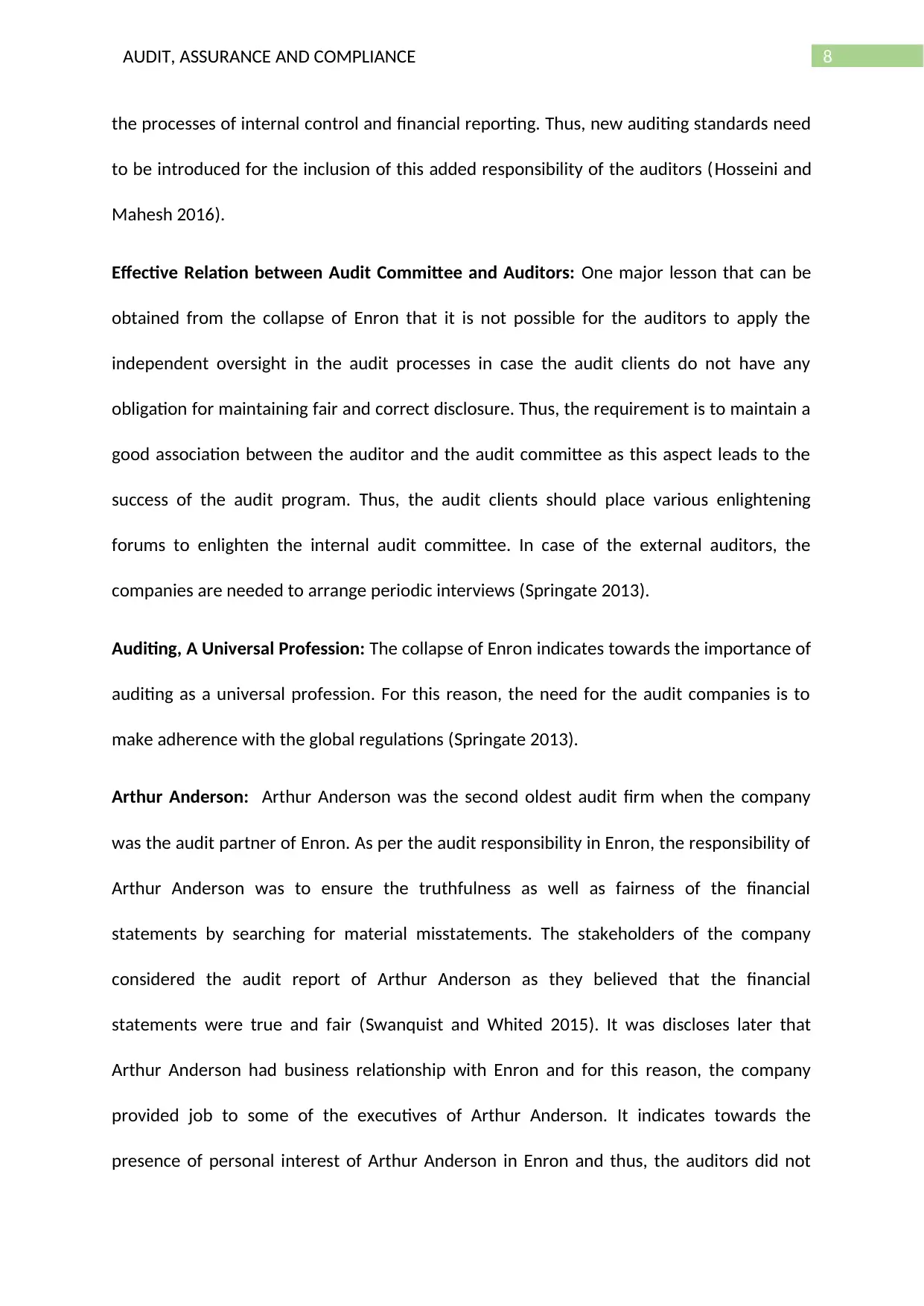
8AUDIT, ASSURANCE AND COMPLIANCE
the processes of internal control and financial reporting. Thus, new auditing standards need
to be introduced for the inclusion of this added responsibility of the auditors (Hosseini and
Mahesh 2016).
Effective Relation between Audit Committee and Auditors: One major lesson that can be
obtained from the collapse of Enron that it is not possible for the auditors to apply the
independent oversight in the audit processes in case the audit clients do not have any
obligation for maintaining fair and correct disclosure. Thus, the requirement is to maintain a
good association between the auditor and the audit committee as this aspect leads to the
success of the audit program. Thus, the audit clients should place various enlightening
forums to enlighten the internal audit committee. In case of the external auditors, the
companies are needed to arrange periodic interviews (Springate 2013).
Auditing, A Universal Profession: The collapse of Enron indicates towards the importance of
auditing as a universal profession. For this reason, the need for the audit companies is to
make adherence with the global regulations (Springate 2013).
Arthur Anderson: Arthur Anderson was the second oldest audit firm when the company
was the audit partner of Enron. As per the audit responsibility in Enron, the responsibility of
Arthur Anderson was to ensure the truthfulness as well as fairness of the financial
statements by searching for material misstatements. The stakeholders of the company
considered the audit report of Arthur Anderson as they believed that the financial
statements were true and fair (Swanquist and Whited 2015). It was discloses later that
Arthur Anderson had business relationship with Enron and for this reason, the company
provided job to some of the executives of Arthur Anderson. It indicates towards the
presence of personal interest of Arthur Anderson in Enron and thus, the auditors did not
the processes of internal control and financial reporting. Thus, new auditing standards need
to be introduced for the inclusion of this added responsibility of the auditors (Hosseini and
Mahesh 2016).
Effective Relation between Audit Committee and Auditors: One major lesson that can be
obtained from the collapse of Enron that it is not possible for the auditors to apply the
independent oversight in the audit processes in case the audit clients do not have any
obligation for maintaining fair and correct disclosure. Thus, the requirement is to maintain a
good association between the auditor and the audit committee as this aspect leads to the
success of the audit program. Thus, the audit clients should place various enlightening
forums to enlighten the internal audit committee. In case of the external auditors, the
companies are needed to arrange periodic interviews (Springate 2013).
Auditing, A Universal Profession: The collapse of Enron indicates towards the importance of
auditing as a universal profession. For this reason, the need for the audit companies is to
make adherence with the global regulations (Springate 2013).
Arthur Anderson: Arthur Anderson was the second oldest audit firm when the company
was the audit partner of Enron. As per the audit responsibility in Enron, the responsibility of
Arthur Anderson was to ensure the truthfulness as well as fairness of the financial
statements by searching for material misstatements. The stakeholders of the company
considered the audit report of Arthur Anderson as they believed that the financial
statements were true and fair (Swanquist and Whited 2015). It was discloses later that
Arthur Anderson had business relationship with Enron and for this reason, the company
provided job to some of the executives of Arthur Anderson. It indicates towards the
presence of personal interest of Arthur Anderson in Enron and thus, the auditors did not
⊘ This is a preview!⊘
Do you want full access?
Subscribe today to unlock all pages.

Trusted by 1+ million students worldwide
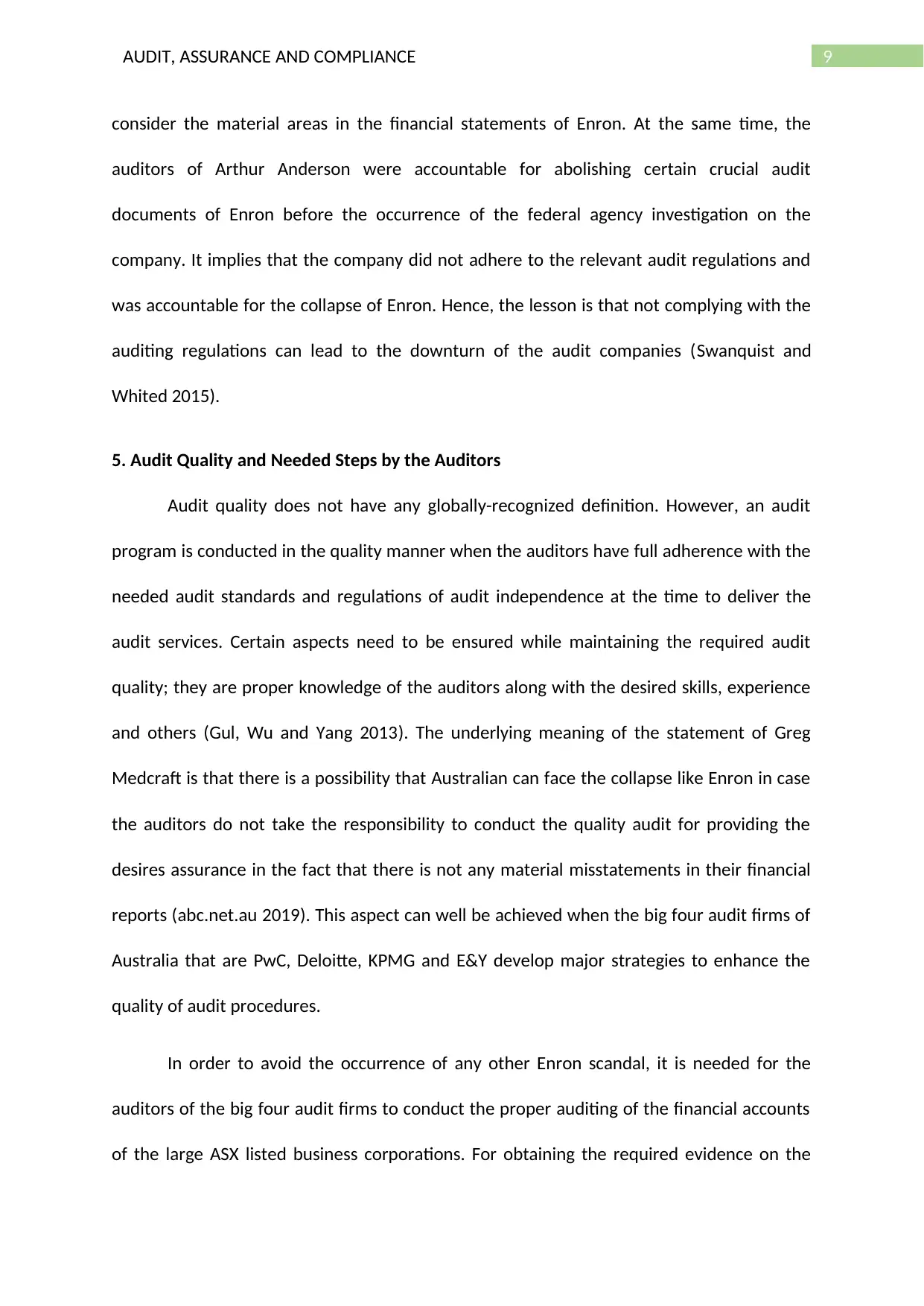
9AUDIT, ASSURANCE AND COMPLIANCE
consider the material areas in the financial statements of Enron. At the same time, the
auditors of Arthur Anderson were accountable for abolishing certain crucial audit
documents of Enron before the occurrence of the federal agency investigation on the
company. It implies that the company did not adhere to the relevant audit regulations and
was accountable for the collapse of Enron. Hence, the lesson is that not complying with the
auditing regulations can lead to the downturn of the audit companies (Swanquist and
Whited 2015).
5. Audit Quality and Needed Steps by the Auditors
Audit quality does not have any globally-recognized definition. However, an audit
program is conducted in the quality manner when the auditors have full adherence with the
needed audit standards and regulations of audit independence at the time to deliver the
audit services. Certain aspects need to be ensured while maintaining the required audit
quality; they are proper knowledge of the auditors along with the desired skills, experience
and others (Gul, Wu and Yang 2013). The underlying meaning of the statement of Greg
Medcraft is that there is a possibility that Australian can face the collapse like Enron in case
the auditors do not take the responsibility to conduct the quality audit for providing the
desires assurance in the fact that there is not any material misstatements in their financial
reports (abc.net.au 2019). This aspect can well be achieved when the big four audit firms of
Australia that are PwC, Deloitte, KPMG and E&Y develop major strategies to enhance the
quality of audit procedures.
In order to avoid the occurrence of any other Enron scandal, it is needed for the
auditors of the big four audit firms to conduct the proper auditing of the financial accounts
of the large ASX listed business corporations. For obtaining the required evidence on the
consider the material areas in the financial statements of Enron. At the same time, the
auditors of Arthur Anderson were accountable for abolishing certain crucial audit
documents of Enron before the occurrence of the federal agency investigation on the
company. It implies that the company did not adhere to the relevant audit regulations and
was accountable for the collapse of Enron. Hence, the lesson is that not complying with the
auditing regulations can lead to the downturn of the audit companies (Swanquist and
Whited 2015).
5. Audit Quality and Needed Steps by the Auditors
Audit quality does not have any globally-recognized definition. However, an audit
program is conducted in the quality manner when the auditors have full adherence with the
needed audit standards and regulations of audit independence at the time to deliver the
audit services. Certain aspects need to be ensured while maintaining the required audit
quality; they are proper knowledge of the auditors along with the desired skills, experience
and others (Gul, Wu and Yang 2013). The underlying meaning of the statement of Greg
Medcraft is that there is a possibility that Australian can face the collapse like Enron in case
the auditors do not take the responsibility to conduct the quality audit for providing the
desires assurance in the fact that there is not any material misstatements in their financial
reports (abc.net.au 2019). This aspect can well be achieved when the big four audit firms of
Australia that are PwC, Deloitte, KPMG and E&Y develop major strategies to enhance the
quality of audit procedures.
In order to avoid the occurrence of any other Enron scandal, it is needed for the
auditors of the big four audit firms to conduct the proper auditing of the financial accounts
of the large ASX listed business corporations. For obtaining the required evidence on the
Paraphrase This Document
Need a fresh take? Get an instant paraphrase of this document with our AI Paraphraser
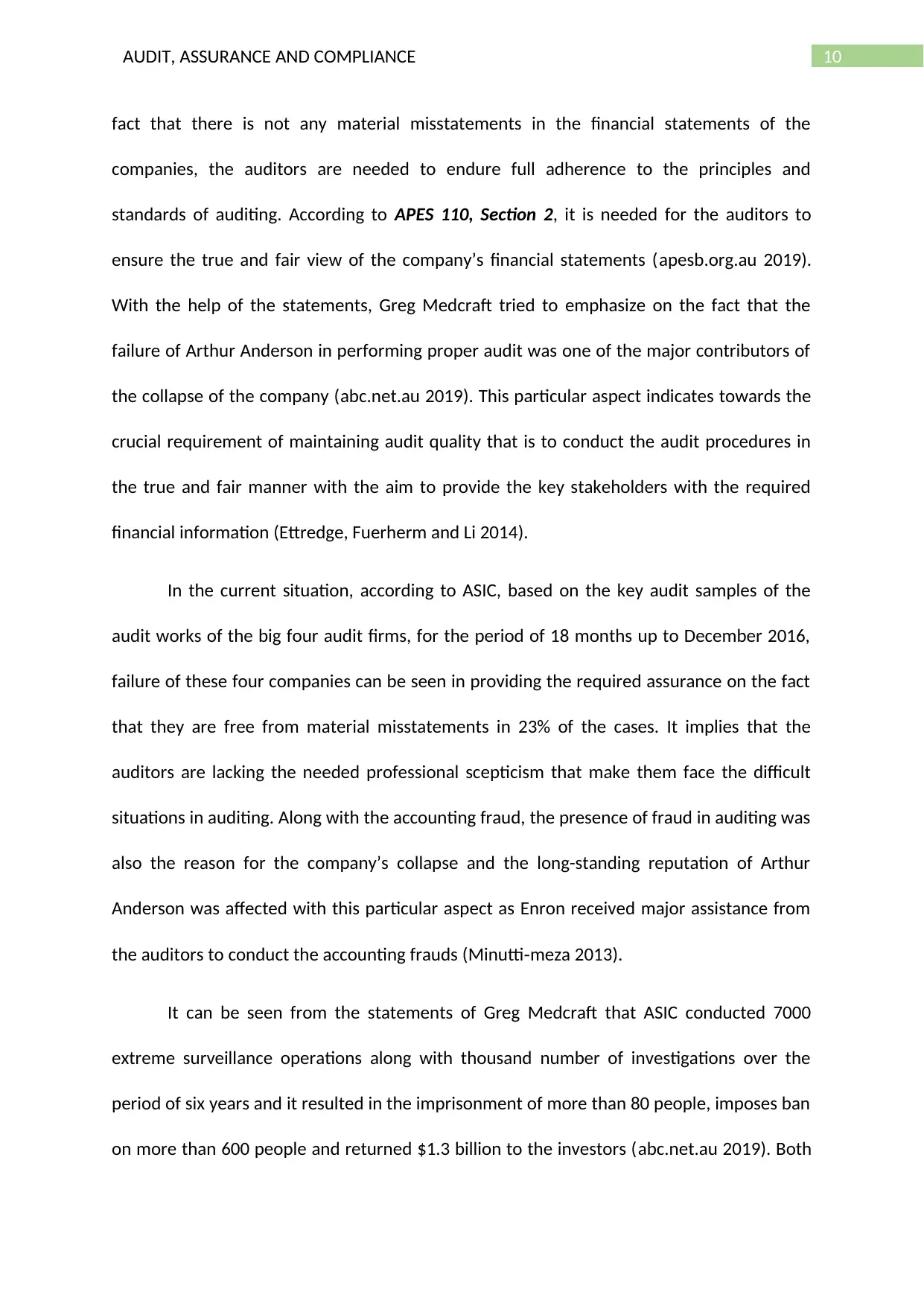
10AUDIT, ASSURANCE AND COMPLIANCE
fact that there is not any material misstatements in the financial statements of the
companies, the auditors are needed to endure full adherence to the principles and
standards of auditing. According to APES 110, Section 2, it is needed for the auditors to
ensure the true and fair view of the company’s financial statements (apesb.org.au 2019).
With the help of the statements, Greg Medcraft tried to emphasize on the fact that the
failure of Arthur Anderson in performing proper audit was one of the major contributors of
the collapse of the company (abc.net.au 2019). This particular aspect indicates towards the
crucial requirement of maintaining audit quality that is to conduct the audit procedures in
the true and fair manner with the aim to provide the key stakeholders with the required
financial information (Ettredge, Fuerherm and Li 2014).
In the current situation, according to ASIC, based on the key audit samples of the
audit works of the big four audit firms, for the period of 18 months up to December 2016,
failure of these four companies can be seen in providing the required assurance on the fact
that they are free from material misstatements in 23% of the cases. It implies that the
auditors are lacking the needed professional scepticism that make them face the difficult
situations in auditing. Along with the accounting fraud, the presence of fraud in auditing was
also the reason for the company’s collapse and the long-standing reputation of Arthur
Anderson was affected with this particular aspect as Enron received major assistance from
the auditors to conduct the accounting frauds (Minutti‐meza 2013).
It can be seen from the statements of Greg Medcraft that ASIC conducted 7000
extreme surveillance operations along with thousand number of investigations over the
period of six years and it resulted in the imprisonment of more than 80 people, imposes ban
on more than 600 people and returned $1.3 billion to the investors (abc.net.au 2019). Both
fact that there is not any material misstatements in the financial statements of the
companies, the auditors are needed to endure full adherence to the principles and
standards of auditing. According to APES 110, Section 2, it is needed for the auditors to
ensure the true and fair view of the company’s financial statements (apesb.org.au 2019).
With the help of the statements, Greg Medcraft tried to emphasize on the fact that the
failure of Arthur Anderson in performing proper audit was one of the major contributors of
the collapse of the company (abc.net.au 2019). This particular aspect indicates towards the
crucial requirement of maintaining audit quality that is to conduct the audit procedures in
the true and fair manner with the aim to provide the key stakeholders with the required
financial information (Ettredge, Fuerherm and Li 2014).
In the current situation, according to ASIC, based on the key audit samples of the
audit works of the big four audit firms, for the period of 18 months up to December 2016,
failure of these four companies can be seen in providing the required assurance on the fact
that they are free from material misstatements in 23% of the cases. It implies that the
auditors are lacking the needed professional scepticism that make them face the difficult
situations in auditing. Along with the accounting fraud, the presence of fraud in auditing was
also the reason for the company’s collapse and the long-standing reputation of Arthur
Anderson was affected with this particular aspect as Enron received major assistance from
the auditors to conduct the accounting frauds (Minutti‐meza 2013).
It can be seen from the statements of Greg Medcraft that ASIC conducted 7000
extreme surveillance operations along with thousand number of investigations over the
period of six years and it resulted in the imprisonment of more than 80 people, imposes ban
on more than 600 people and returned $1.3 billion to the investors (abc.net.au 2019). Both
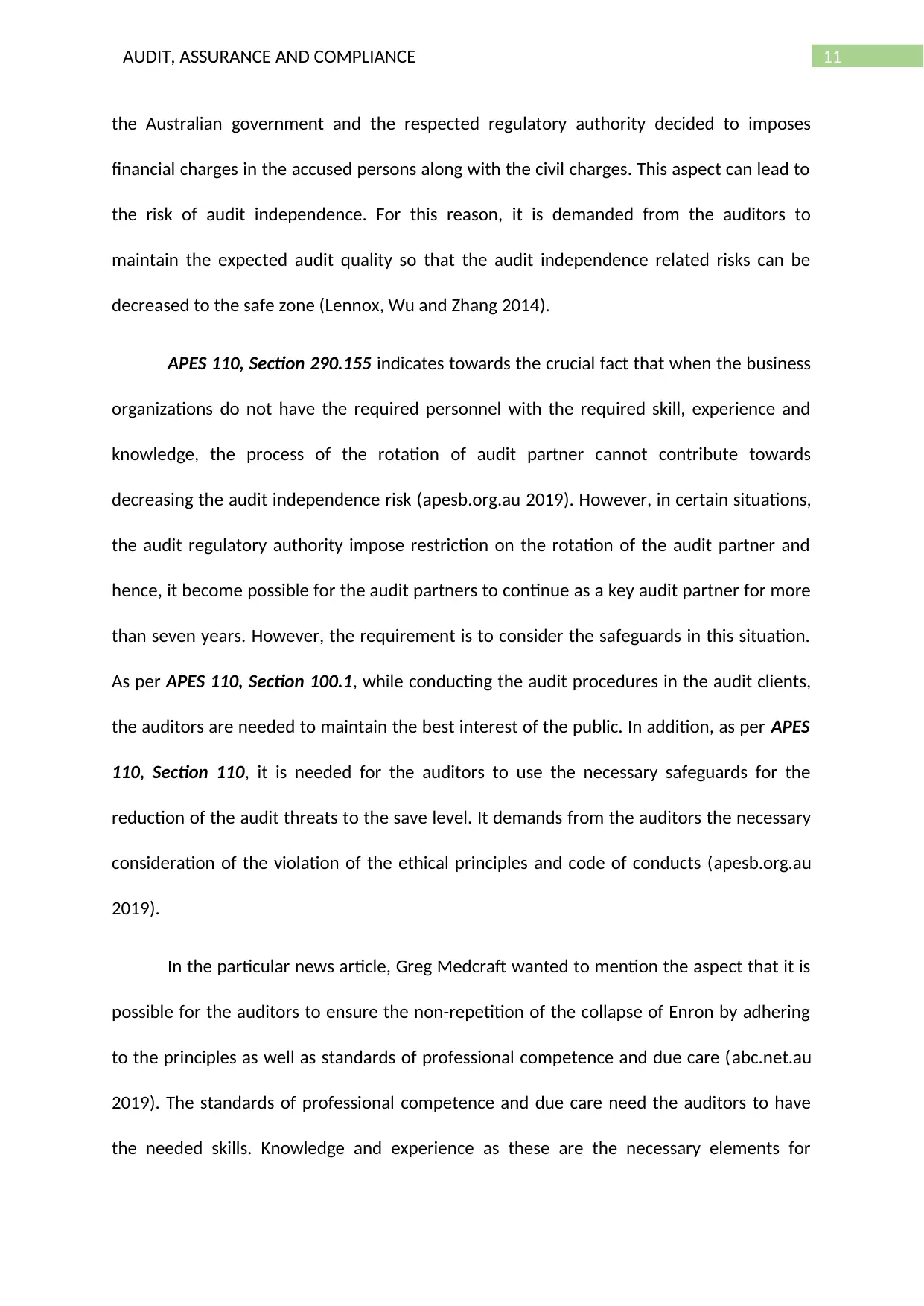
11AUDIT, ASSURANCE AND COMPLIANCE
the Australian government and the respected regulatory authority decided to imposes
financial charges in the accused persons along with the civil charges. This aspect can lead to
the risk of audit independence. For this reason, it is demanded from the auditors to
maintain the expected audit quality so that the audit independence related risks can be
decreased to the safe zone (Lennox, Wu and Zhang 2014).
APES 110, Section 290.155 indicates towards the crucial fact that when the business
organizations do not have the required personnel with the required skill, experience and
knowledge, the process of the rotation of audit partner cannot contribute towards
decreasing the audit independence risk (apesb.org.au 2019). However, in certain situations,
the audit regulatory authority impose restriction on the rotation of the audit partner and
hence, it become possible for the audit partners to continue as a key audit partner for more
than seven years. However, the requirement is to consider the safeguards in this situation.
As per APES 110, Section 100.1, while conducting the audit procedures in the audit clients,
the auditors are needed to maintain the best interest of the public. In addition, as per APES
110, Section 110, it is needed for the auditors to use the necessary safeguards for the
reduction of the audit threats to the save level. It demands from the auditors the necessary
consideration of the violation of the ethical principles and code of conducts (apesb.org.au
2019).
In the particular news article, Greg Medcraft wanted to mention the aspect that it is
possible for the auditors to ensure the non-repetition of the collapse of Enron by adhering
to the principles as well as standards of professional competence and due care (abc.net.au
2019). The standards of professional competence and due care need the auditors to have
the needed skills. Knowledge and experience as these are the necessary elements for
the Australian government and the respected regulatory authority decided to imposes
financial charges in the accused persons along with the civil charges. This aspect can lead to
the risk of audit independence. For this reason, it is demanded from the auditors to
maintain the expected audit quality so that the audit independence related risks can be
decreased to the safe zone (Lennox, Wu and Zhang 2014).
APES 110, Section 290.155 indicates towards the crucial fact that when the business
organizations do not have the required personnel with the required skill, experience and
knowledge, the process of the rotation of audit partner cannot contribute towards
decreasing the audit independence risk (apesb.org.au 2019). However, in certain situations,
the audit regulatory authority impose restriction on the rotation of the audit partner and
hence, it become possible for the audit partners to continue as a key audit partner for more
than seven years. However, the requirement is to consider the safeguards in this situation.
As per APES 110, Section 100.1, while conducting the audit procedures in the audit clients,
the auditors are needed to maintain the best interest of the public. In addition, as per APES
110, Section 110, it is needed for the auditors to use the necessary safeguards for the
reduction of the audit threats to the save level. It demands from the auditors the necessary
consideration of the violation of the ethical principles and code of conducts (apesb.org.au
2019).
In the particular news article, Greg Medcraft wanted to mention the aspect that it is
possible for the auditors to ensure the non-repetition of the collapse of Enron by adhering
to the principles as well as standards of professional competence and due care (abc.net.au
2019). The standards of professional competence and due care need the auditors to have
the needed skills. Knowledge and experience as these are the necessary elements for
⊘ This is a preview!⊘
Do you want full access?
Subscribe today to unlock all pages.

Trusted by 1+ million students worldwide
1 out of 17
Related Documents
Your All-in-One AI-Powered Toolkit for Academic Success.
+13062052269
info@desklib.com
Available 24*7 on WhatsApp / Email
![[object Object]](/_next/static/media/star-bottom.7253800d.svg)
Unlock your academic potential
Copyright © 2020–2025 A2Z Services. All Rights Reserved. Developed and managed by ZUCOL.





